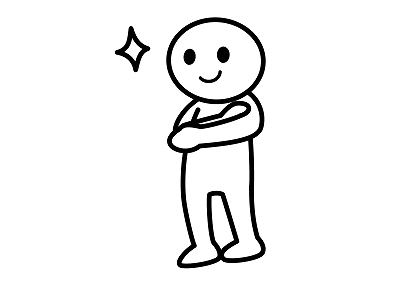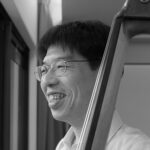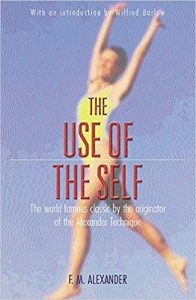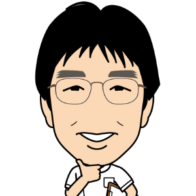「正解」に頼らないレッスン
こんにちは!ハリ弟子です。
昨日、アレクサンダー・テクニークのレッスンに「正解を求めてくるとがっかりするかも」と書いてから、あれ?アレクサンダー本人は自分のやってることが正しいかどうかどうやって判断したんだろう?とふと思いました。
正しいかどうかと言うと表現がちょっとあれですが、アレクサンダー本人も声枯れを治すためにいろんなことを試行錯誤していて、その過程で「アレクサンダー・テクニーク」なるものを確立していったわけです。
ということは試行錯誤する中で良いと思ったことをピックアップして筋道立てたりまとめていかないと、テクニークとか方法論の形にはならなかったはずです。
何を基準に「良い」と判断したのでしょうか?
現在のアレクサンダー・テクニーク教師は全員すでに「アレクサンダー・テクニーク」というものがある前提で「それ」を学んでいます。
資格取得に当たって試験もあります。
なので、テクニークとか方法論が先にあって、生徒さんの問題・関心と無関係にいわば「アレクサンダー・テクニーク」的な「正解」を教えることがレッスンだと思ってないか?

そんなふうにふと思ったわけです。
そこでアレクサンダー本人が書いた本に当たってみます。
画像クリックで原著英語版のアマゾンのページに飛びますが、和訳されたものもいくつかあるようです。
この本の第1章が”Evolution of a Technique”という題でアレクサンダー・テクニークが確立された過程が書いてあります。
ハリ弟子は何度も読んでいるのですが、これまではテクニークっていったい何なの?というおいしいところにばかり気が向いていました。
アレクサンダーも最後の方でそのあんちょこをまとめてくれています。
Supposing that the “end” I decided to work for was to speak a certain sentence, I would start
in the same way as before and
(1) inhibit any immediate response to the stimulus to speak the sentence,
(2) project in their sequence the directions for the primary control which I had reasoned out as being best for the purpose of bringing about the new and improved use of myself in speaking, and
(3) continue to project these directions until I believed I was sufficiently au fait with them to employ them for the purpose of gaining my end and speaking the sentence.
At this moment — the moment that had always proved critical for me because it was then
that I tended to revert to my wrong habitual use — I would change my usual procedure and
(4) while still continuing to project the directions for the new use I would stop and consciously reconsider my first decision, and ask myself “Shall I after all go on to gain the end I have decided upon and speak the sentence? Or shall I not? Or shall I go on to gain some other end altogether?” — and then and there make a fresh decision,
(5) either not to gain my original end, in which case I would continue to project the directions for
maintaining the new use and not go on to speak the sentence;
or
to change my end and do something different, say, lift my hand instead of speaking the sentence, in which case I would continue to project the directions for maintaining the new use to carry out this last decision and lift my hand;
or
to go on after all and gain my original end, in which case I would continue to project the directions for maintaining the new use to speak the sentence.
これはいわば「正解」です。
今回はしかしここには注目せず、直前の一文が目に止まりました。
”gaining experience which proved to be of great value and interest to me”(自分にとって大きな価値と利点があることを証明するような体験をすることで)とあります。
前後がなくてここだけだと分かりづらいですが、声枯れの解決に役に立つ体験をしたので、上の(1)~(5)のプランを採用することにしたようです。
他の部分ではどうでしょう?
あんちょこの(2)に気づいた時のことをアレクサンダーは以下のように書いています。
“with the prevention of the misuse of these parts I tended to become less hoarse while reciting, and that as I gradually gained experience in this prevention, my liability to hoarseness tended to decrease. (これらの部位の間違った使い方を予防することで朗誦時の声枯れがましになってきたし、予防の経験を徐々に積んでいくにつれて声枯れになりにくくなってきました。)
“I found that the best conditions of my larynx and vocal mechanisms and the least tendency to hoarseness were associated with a lengthening of the stature.”(声枯れの傾向がもっとも小さく、喉頭と発声器官がベストなコンディションでいることは、背がのびやかになっていることに結びついていると気づきました。)
あんちょこ(3)についてもこのように言及しています。
そして第1章”Evolution of a Technique”はこんなダメ押しで締めくくられます。



2016年、東京都練馬区の江古田にて音楽家専門の鍼灸治療院を始める。
2021年、東京都品川区の鍼灸院「はりきゅうルーム カポス」に移籍。音楽家専門の鍼灸を開拓し続ける。
はり師|きゅう師|アレクサンダー・テクニーク教師




